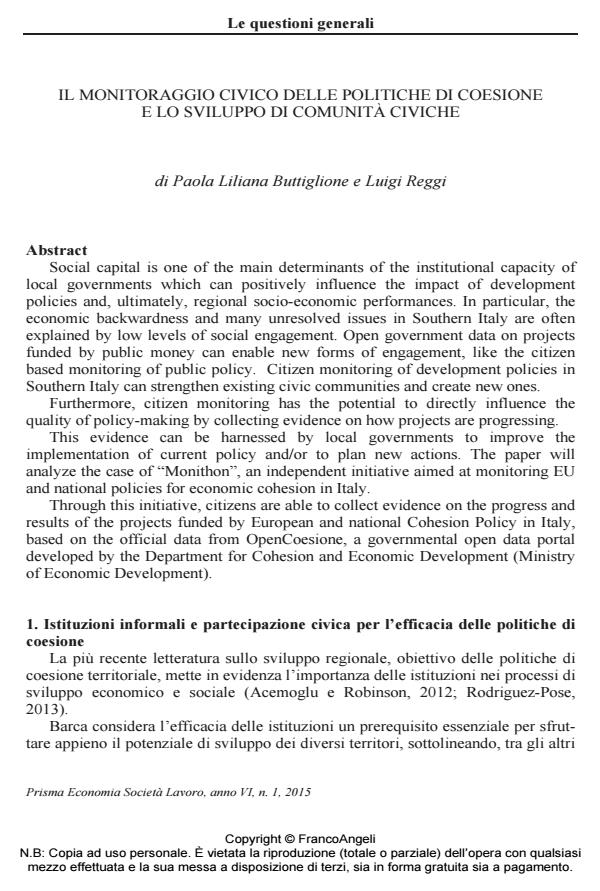Il monitoraggio civico delle politiche di coesione e lo sviluppo di comunità civiche
Titolo Rivista PRISMA Economia - Società - Lavoro
Autori/Curatori Paola Liliana Buttiglione, Luigi Reggi
Anno di pubblicazione 2015 Fascicolo 2015/1
Lingua Italiano Numero pagine 17 P. 81-97 Dimensione file 154 KB
DOI 10.3280/PRI2015-001007
Il DOI è il codice a barre della proprietà intellettuale: per saperne di più
clicca qui
Qui sotto puoi vedere in anteprima la prima pagina di questo articolo.
Se questo articolo ti interessa, lo puoi acquistare (e scaricare in formato pdf) seguendo le facili indicazioni per acquistare il download credit. Acquista Download Credits per scaricare questo Articolo in formato PDF

FrancoAngeli è membro della Publishers International Linking Association, Inc (PILA), associazione indipendente e non profit per facilitare (attraverso i servizi tecnologici implementati da CrossRef.org) l’accesso degli studiosi ai contenuti digitali nelle pubblicazioni professionali e scientifiche.
Social capital is one of the main determinants of the institutional capacity of local governments which can positively influence the impact of development policies and, ultimately, regional socio-economic performances. In particular, the economic backwardness and many unresolved issues in Southern Italy are often explained by low levels of social engagement. Open government data on projects funded by public money can enable new forms of engagement, like the citizen based monitoring of public policy. Citizen monitoring of development policies in Southern Italy can strengthen existing civic communities and create new ones. Furthermore, citizen monitoring has the potential to directly influence the quality of policy-making by collecting evidence on how projects are progressing. This evidence can be harnessed by local governments to improve the implementation of current policy and/or to plan new actions. The paper will analyze the case of "Monithon", an independent initiative aimed at monitoring EU and national policies for economic cohesion in Italy. Through this initiative, citizens are able to collect evidence on the progress and results of the projects funded by European and national Cohesion Policy in Italy, based on the official data from OpenCoesione, a governmental open data portal developed by the Department for Cohesion and Economic Development (Ministry of Economic Development).
- Electronic Government Luigi Reggi, Sharon Dawes, pp.74 (ISBN:978-3-319-44420-8)
- Critical data literacy in praxis: An open education approach for academic development Javiera Atenas, Leo Havemann, Virginia Rodés, Manuel Podetti, in Edutec. Revista Electrónica de Tecnología Educativa /2023 pp.49
DOI: 10.21556/edutec.2023.85.2851 - Critical literacies for a datafied society: academic development and curriculum design in higher education Javiera Atenas, Leo Havemann, Cristian Timmermann, in Research in Learning Technology /2020
DOI: 10.25304/rlt.v28.2468 - “Alloyed Networks” Against Corruption: Between Community Engagement and ICTs Francesca Rispoli, Alberto Vannucci, in International Journal of Politics, Culture, and Society /2025
DOI: 10.1007/s10767-025-09538-0
Paola Liliana Buttiglione, Luigi Reggi, Il monitoraggio civico delle politiche di coesione e lo sviluppo di comunità civiche in "PRISMA Economia - Società - Lavoro" 1/2015, pp 81-97, DOI: 10.3280/PRI2015-001007